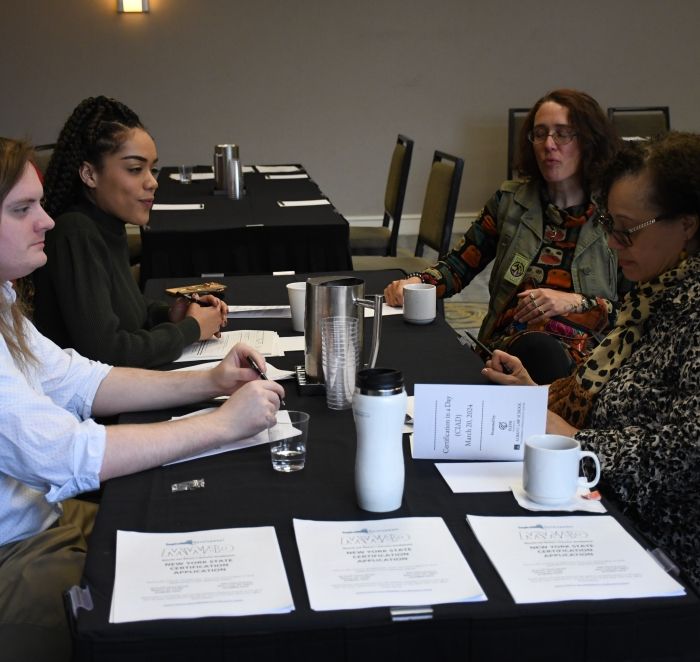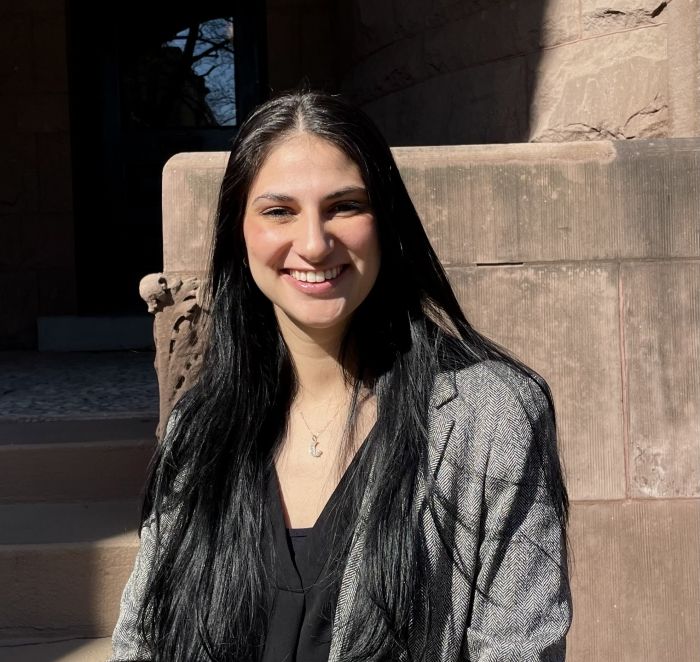Students' Appellate Court Victory Featured in the New York Law Journal
On March 1, 2006, the New York Law Journal featured a story about a recent favorable decision in an Albany Law School clinic case issued by the Supreme Court, Appellate Division, Third Department.
Albany Law Students Win Appeal Over Denial of Benefits
A four-year David v. Goliath battle pitting a cadre of aspiring lawyers at Albany Law School against New York state and its attorney general culminated in dramatic fashion last week when the students won a 5-0 appellate court victory, and perhaps even helped establish a legal precedent.
Matter of Debra VV., 98713, involved a woman struggling to care for the child and grandchildren of her terminally ill sister. She was misinformed about the availability of kinship benefits and turned to the Health Law Project at Albany Law School for help. The clinical program took the case and ran with it. Over four years, about a half dozen students worked the file. In January, a third-year student was permitted to argue the case before the Appellate Division, Third Department.
And last week, she came away with a unanimous reversal, written by Justice Thomas Mercure, of an agency ruling denying benefits.
"The students saw justice in action," said Joseph M. Connors, associate clinical professor and director of the Health Law Project. "They are not only acquiring legal skills - legal research, factual investigation, presenting the case at a hearing, learning about the appellate process - but ultimately got to feel the power of the justice system, to see how it can work to the benefit of people in need. So, they were a part of social justice here."
Mr. Connors mentored the students, and directly supervised the appellate argument presented by Katie Harris. The Third Department cooperates with the Albany Law School clinical program in permitting students, under the close watch of an admitted attorney, to argue before its justices. Ms. Harris did just that on Jan. 13.
The case centered on the last wishes of a deathly ill woman, and the efforts of her sister to keep the family together.
Court records show that Debra's sister had legal custody of her daughter, who was then 16, and two toddler grandchildren in 2002. But since she was dying and could not care for the children, the Albany County Department for Children, Youth and Families sought emergency removal.
To avoid having the children placed with strangers, the mother/grandmother sought to transfer the children to Debra under the Families in Transition Act. Debra requested kinship foster care benefits, but was incorrectly informed by the caseworker that there was no such thing. She then applied to Family Court for and was granted permanent custody. Two months later, after her sister died, Debra again applied for benefits. That time, benefits were denied because the children were no longer in the custody of the social services department.
Students at Albany Law School who were enlisted by a hospital social worker brought an administrative appeal to the state Office of Children and Family Services. After the state upheld the local denial of benefits, the students filed an Article 78 petition - an inherently difficult proposition since an administrative determination may be overturned only for irrationality. Last week, the Third Department agreed with Ms. Harris, the Albany law student, that the agency's decision was, indeed, irrational.
"In light of the social service agency's statutory mandate to assist petitioner in becoming a foster parent and obtaining benefits, we conclude that the determination that petitioner was not entitled to benefits simply because [the county] failed to place the children with her is irrational," Justice Mercure wrote. The panel, which also included Presiding Justice Anthony V. Cardona, Karen K. Peters, Anthony J. Carpinello and Robert S. Rose, recognized, possibly for the first time, an affirmative duty under both the Families in Transition Act and Social Services regulations to provide accurate information to families seeking assistance.
Assistant Attorney General Jennifer Grace Miller defended the state in Matter of Debra VV. The attorney general's office declined comment. There was no immediate comment from the Office of Children and Family Services.
'Nerve Wracking' Experience
Ms. Harris, a native of Albany who plans to pursue a career in public interest law following her graduation in May, admitted the experience of arguing her first appeal was "a little nerve wracking."
"I had prepared a lot with Professor Connors," Ms. Harris said. "We went over and over the arguments, trying to figure out what were our best and weakest points. But no matter how much you are prepared, there is definitely a little nervousness. I don't know that I slept much in the week leading up to it."
But the student said she got over her jitters when she was asked a question by Presiding Justice Cardona, a congenial man who tends to put both experienced and inexperienced counsel at ease.
"The Health Law clinic has had a great impact on myself and my future legal career," Ms. Harris said. "It's provided me with the confidence and skills that will hopefully carry me through."
The Health Law Project is one of six in-house clinical legal programs at Albany Law School run by professors Mary Lynch and Nancy Maurer. The school also offers in-house clinical programs in civil rights and disabilities law, family violence litigation, domestic violence prosecution, litigation and low income taxpayer legal issues. Additionally, Professor Laurie Shanks runs a field placement program in which roughly 220 students are placed with local agencies, judges, prosecutors, defense organizations and public interest groups.
Mr. Connors said 10 second and third-year students per year are accepted into the Health Law Project, which helps economically disadvantaged clients secure social service and human service benefits, drafts health care proxies, represents people in Family Court matters, sets up emergency child care plans and undertakes other legal chores on behalf of people with health-related problems.





